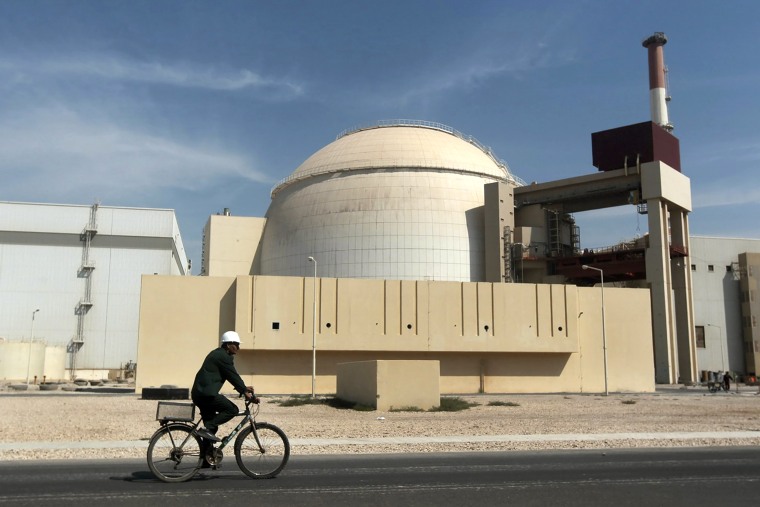WASHINGTON — The United States is waiving sanctions on Iran’s civil nuclear program as the Biden administration races to secure a return to the 2015 nuclear deal with Tehran.
The State Department notified Congress of the waiver Friday, according to documents obtained by NBC News. The change in policy would allow other countries to cooperate on certain nonproliferation activities necessary to return to the international nuclear agreement.
The move comes at a critical time. Nuclear talks between world powers are entering their final stretch, with negotiators in Vienna hoping to revive the Obama-era agreement known as the Joint Comprehensive Plan of Action, or JCPOA. On top of that, Iran is just weeks away from being able to produce enough weapons grade material for a nuclear bomb.
A senior State Department official denied that Friday’s step was a concession to Iran and instead characterized it as a “return to the status quo.”
“This is not a signal that we are about to reach an understanding on a mutual return to full implementation of the JCPOA,” the official said.
The sanctions waiver “is designed to facilitate discussions that would help to close a deal on a mutual return to full implementation of the JCPOA and lay the groundwork for Iran’s return to performance of its JCPOA commitments,” the State Department said in its report to Congress, adding it is also designed to “constrain Iran’s nuclear activities.”
“Absent this sanctions waiver, detailed technical discussions with third parties regarding disposition of stockpiles and other activities of nonproliferation value cannot take place,” the senior State Department official said.
The 2015 nuclear deal imposed restrictions on Iran’s nuclear program in return for an easing of economic sanctions. Former President Donald Trump pulled the U.S. out of the accord in 2018 and reimposed sanctions. Since then, Iran has steadily exceeded the deal’s limits on its nuclear activity, raising concerns that Tehran could soon have enough fissile material for an atomic bomb.
Even after withdrawing from the deal, the Trump administration kept the sanctions waiver in place until May of 2020, arguing they were necessary to maintain oversight over Iran’s nuclear program and help reduce proliferation risks.
Iran denies it has any plans to build nuclear weapons.
Some arms control experts said Friday that the decision by the Biden administration indicated Iran and world powers could be near an agreement.
“These sanctions waivers allow for international cooperation on activities that help reduce Iran’s nuclear potential and are a sign that a deal on full and mutual return to compliance may be within reach,” said Daryl Kimball of the nonprofit Arms Control Association.
Naysan Rafati, an analyst with the International Crisis Group think tank, said that “if the negotiations in Vienna are going to restore the nuclear side of the agreement, having these waivers would be part and parcel of its implementation.
"That's not to say a diplomatic breakthrough is necessarily imminent, but it's one piece in that puzzle,” he added.
The late Friday announcement is likely to evoke criticism from Iran hawks on both sides of the congressional aisle who have questioned the Biden administration’s approach to Iran resurrecting the 2015 deal.
A law enacted the same year as the initial agreement gives Congress the opportunity to review any nuclear agreements with Iran.
In an hourlong floor speech Wednesday, Senate Foreign Relations Committee Chairman Bob Menendez, D-N.J., said even if Iran returned to compliance with the nuclear restrictions in the 2015 deal, Tehran had gained technical know-how that could not be undone.
“While the deal the U.S. and our partners are pursuing in Vienna would ostensibly seek to reverse technological advancements, the acquisition of knowledge is never reversible,” he said. “At this point, we seriously have to ask, ‘What exactly are we trying to salvage?'”

